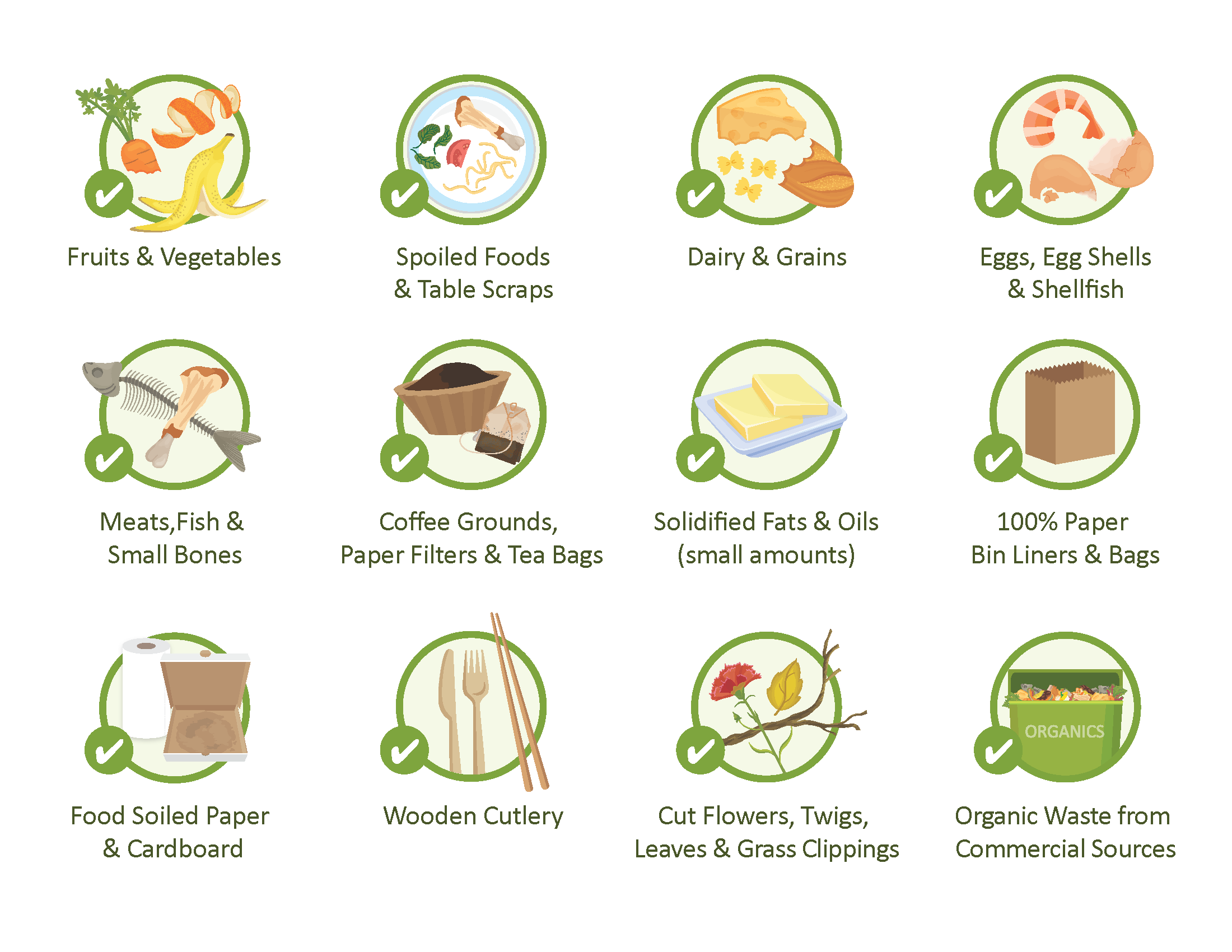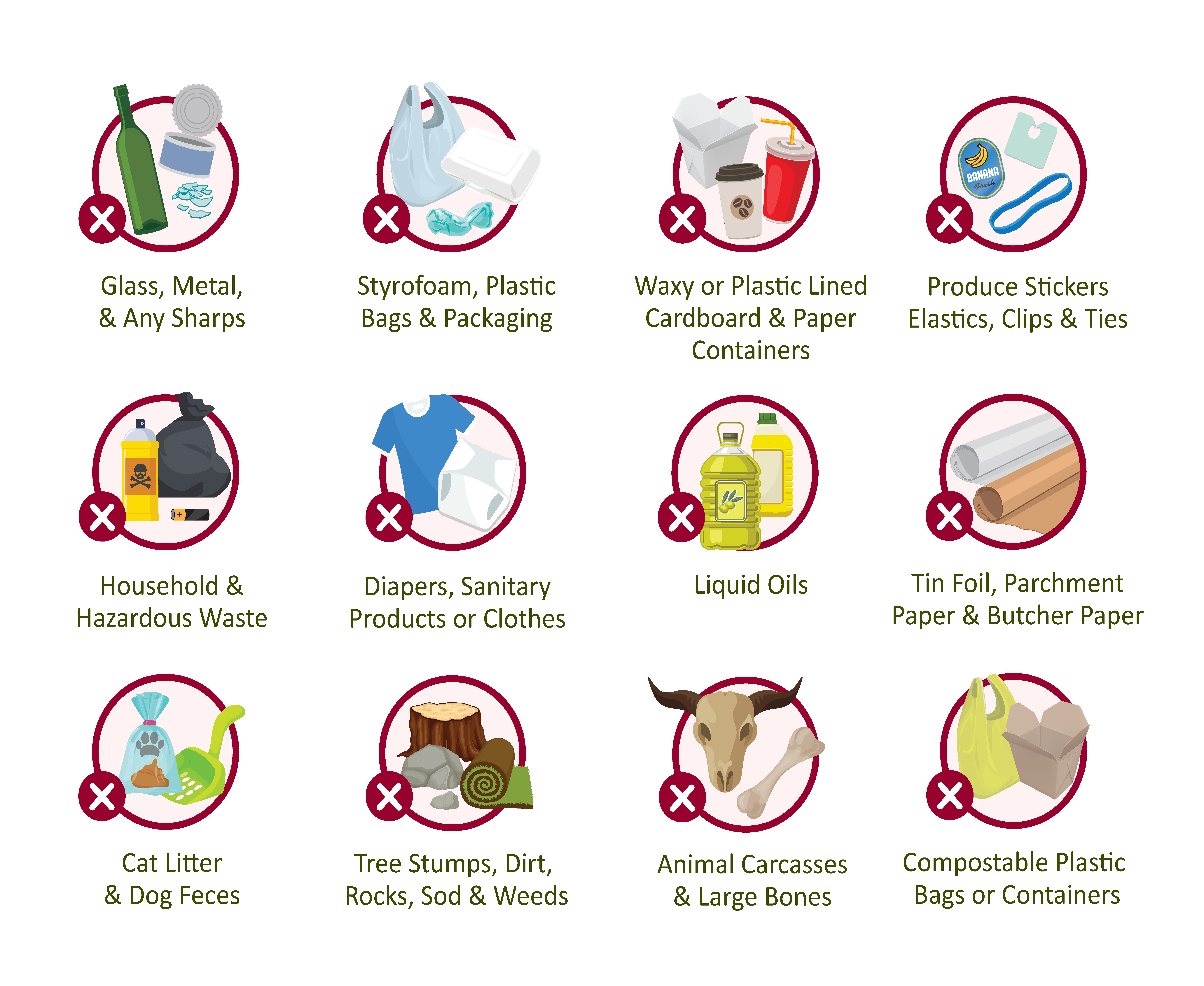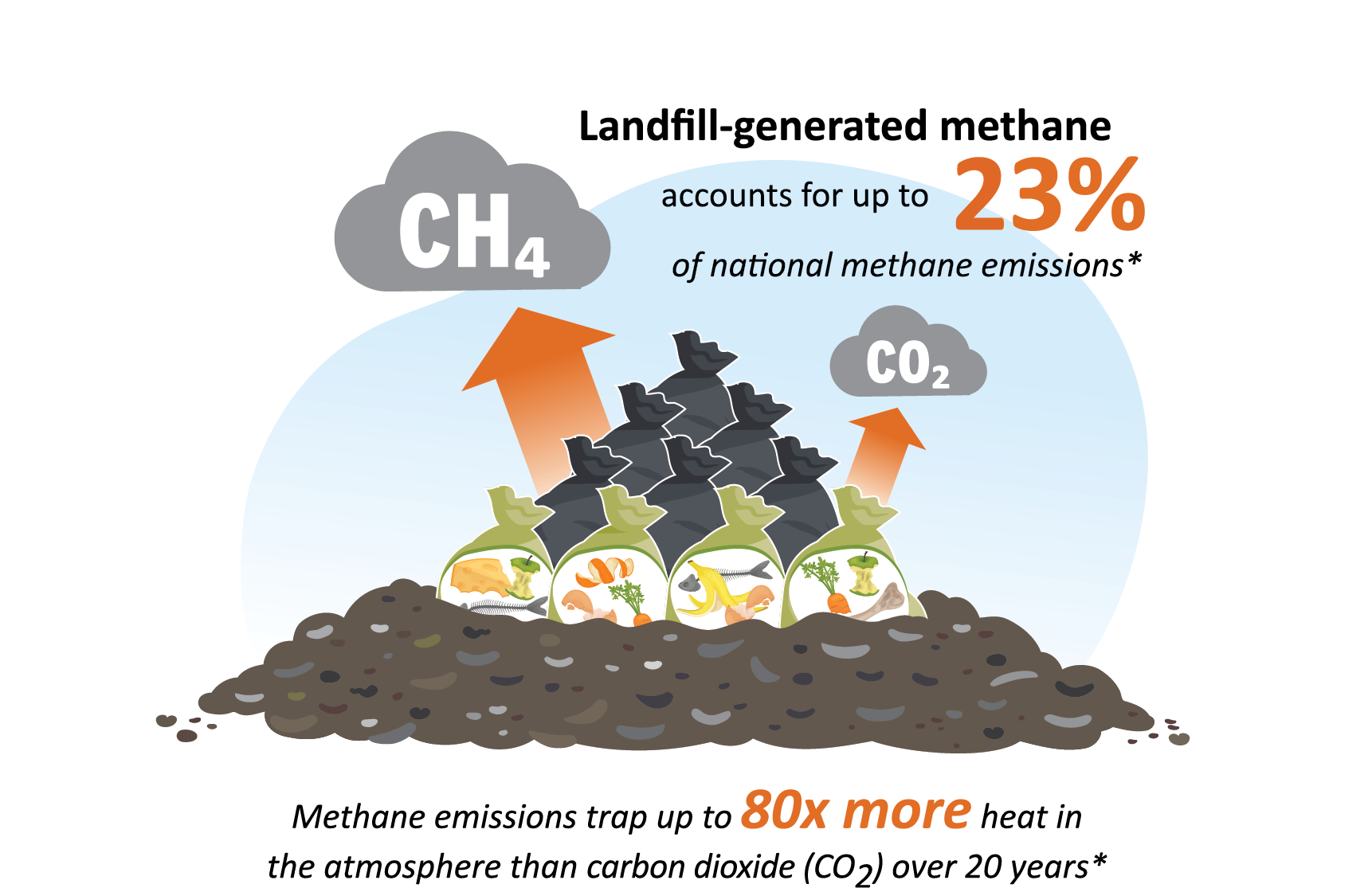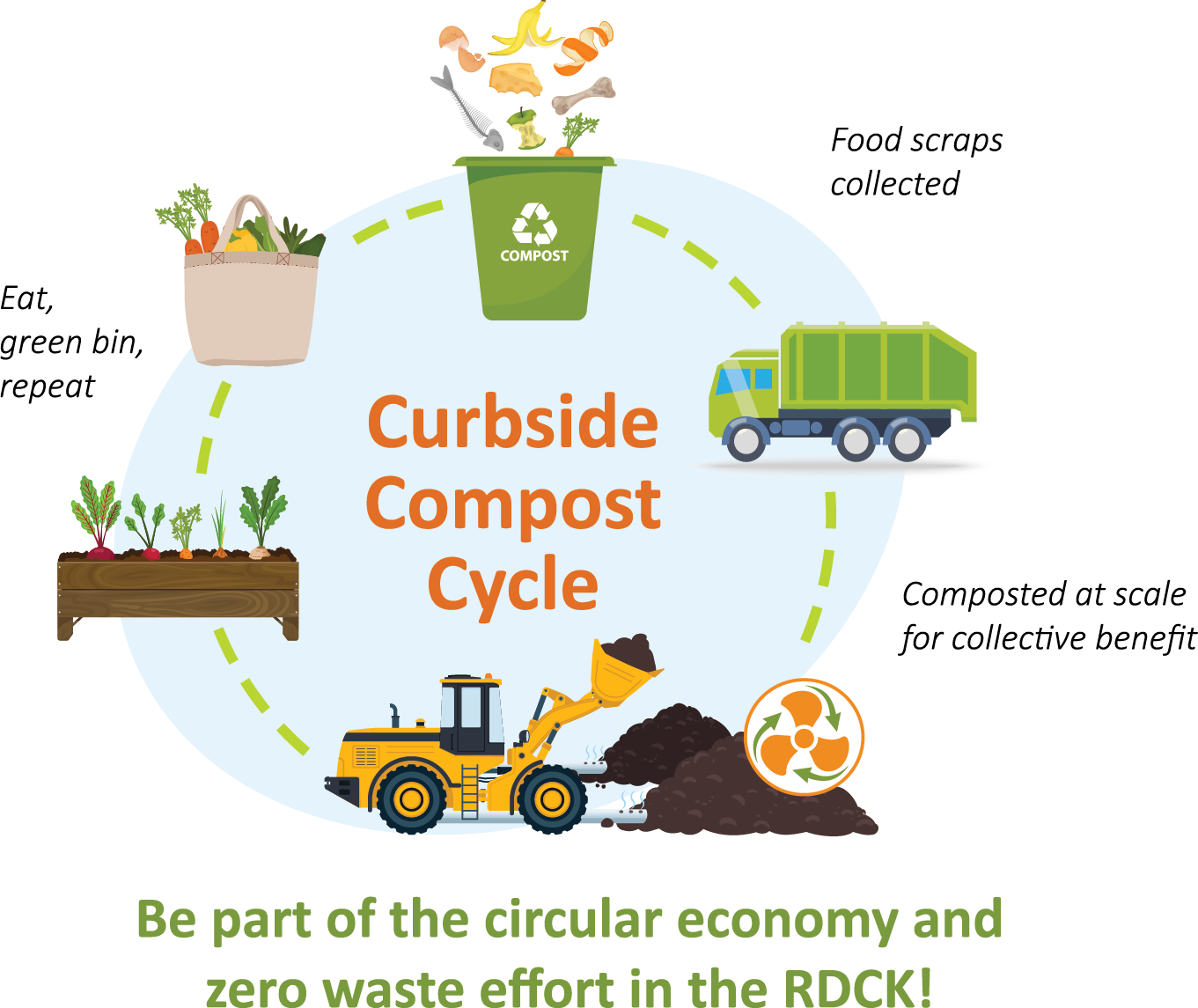Organics Diversion

Page Map:
- Public Access
- Accepted Materials
- Prohibited Materials
- Curbside Collection Services
- Commercial Organic Waste
- Tips and Tricks - Keeping Composting Clean and Wildlife Safe
- Why Composting, Why Now?
- How it Works
The RDCK now has disposal and processing infrastructure to accept and turn organic waste into compost, diverting this material from our finite, regional landfills.
During regular hours of operations, customers can dispose of organic waste at the following four RDCK Waste Disposal Facilities.
Public Access
| Facility |
| Central (Salmo) Transfer Station |
| Grohman Narrows Transfer Station |
| Ootischenia Landfill & Transfer Station |
If container loads are brought in with Mixed Waste, the first container can be disposed of for free. Otherwise, the fee is $2.50 per container (120L max), up to 3 containers.
4 or more containers will be charged the minimum fee of $9.75; or, if weighing more than 100kgs, 10% of tonnage at $96.75/tonne.
Any loads from the public that could fill a pick-up truck bed (1.5m³) requires 48-hour notice. Call 250-352-8161 to book a disposal appointment, or if you have any questions.
View the 2024 Organic Waste Disposal Guide:
2024-01-RDCK-ORGANICSUserGuide-Brochure-FINAL.pdf [PDF - 3 MB]
Accepted Materials

Prohibited Materials

Organic waste disposal is governed by the Resource Recovery Facilities Regulatory Bylaw. Schedule I and H of the Bylaw outline the accepted and prohibited material list.
Curbside Collection Services
Curbside pickup is a convenient and effective method of collecting waste in higher density locations. The RDCK Composting Facilities can take a wider range of materials than can typically be composted at home, such as meats, small bones, dairy and cooked foods. We encourage anyone with curbside services to utilize them.
Creston
Visit the Town of Creston's website for municipality specific information on their curbside collection program.
Castlegar
Visit the City of Castlegar's website for municipality specific information on their curbside collection program.
City of Nelson
Eligible City of Nelson residents can expect to receive an in-home appliance that will dehydrate and grind food waste into a material that can be composted in the RDCK facilities or in backyard composters. Visit Nelson.ca/organics for more details.
Commercial Organic Waste
The Industrial, Commercial, and Institutional (ICI) sector is encourgaed to participate in the RDCK Organic Waste Diversion Program. Learn more on our ICI Organics Webpage. The RDCK is currently looking for feedback from the ICI Sector on Organics Recycling. Complete the survey to help the RDCK develop programs and resources for ICI Organics Recycling at engage.rdck.ca
Tips and Tricks - Keeping Composting Clean and Wildlife Safe
Managing organic waste properly protects wildlife and keeps communities safe. It’s also cleaner, and less smelly. A few new simple habits are needed to successfully divert organic waste from the landfill.
Kitchen Catchers: On your counter, keep a small “catcher” to collect your kitchen scraps.
- Place paper towel, napkins, a paper bag or newspaper in the bottom to collect moisture
- Remember: No compostable plastic bags or liners
- Or, use a cellulose based liner – the only ones currently available are Bag to Earth's cellulose lined bags.
- Always give your catcher a rinse after emptying.
- In the summer months store your Kitchen Catcher in the freezer or fridge to minimize smells and reduce fruit flies.
- Keep meats, bones, cheese and cooked food in the freezer until disposal day – to minimize smell.
Collection / Disposal Containers: Whenever possible, keep your garbage and organics carts/bins behind a locking/enclosed structure (inside your house/garage is the best option). Of course, many have to store their waste outside, where the critters are. Either way:
- Place straw, leaves, or paper in the bottom of your container
- OR, use a 100% cellulose container liner
- If possible, add leaves, straw, or paper (browns) each time you add kitchen waste to your bin
- Adding browns keeps the smells and bugs down
- Rinse your container after each collection/disposal
- Spray the lid of your container with an Ammonia based cleaner – bears dislike the smell, and are more likely to avoid your bin if you do this. Just the lid though, not the organic waste
- Take out meat, dairy and cooked food from the freezer only on collection/disposal day
- Lock or secure your bin to something, so it can’t be dragged away
- Ideally, bins are kept inside a secure enclosure/indoors
- Purchase or install a locking bin or mechanism for the bin lid. This will increase the difficulty a bear may have in gaining access.
- Remember, this is only to delay a bear’s efforts. Most residential bins will eventually succumb to a determined bears attempts at entry. All other steps must be followed to reduce and prevent bear habituation to garbage.
- Never put out your organics bin the night before collection/disposal day
For more resources on Wildlife Safety, visit WildSafeBC.com
Why Composting, Why Now?
Reduce Landfill Emissions
Rotting organic waste buried in the landfill creates methane (CH4). Methane is a Greenhouse Gas (GHG) more potent that CO2, and traps heat from the sun in the atmosphere. Landfill GHG emissions accelerate climate change, and we are more aware than ever that a changing climate is a problem for everyone. Now is the time to take these steps. Every action to reduce GHG emissions counts.
Extend Landfill Life
We don't have limitless space in our landfills. Keeping organic waste out of the trash frees up much needed capacity and extends their working life. While we’ve planned for the future and manage landfills for the long-term, the added space buys time and reduces the long-term costs of putting what can’t be re-used or recycled in its final resting place.
Less Trash More Soil
Organic waste provides a valuable resource when properly composted. Compost helps recycle nutrients back into soil, and healthy soils grow healthy plants for the benefit of all. Additionally, soil itself stores carbon from the atmosphere - the more life within soil, the more carbon captured and stored. Indeed, less is more.
How it Works
Composting occurs when high nitrogen organic material (greens) is mixed with high carbon organic material (browns) in ideal ratios, with plenty of oxygen and proper moisture. This environment allows decomposing microbes to thrive as they rapidly break down organic wastes into a healthy, alive, nutrient dense product known as compost. Compost is an excellent soil amendment, as these nutrients are readily available to plants for their growth.
The Central and Creston Composting Facilities both use active aeration to maintain proper temperature and oxygen levels during the decomposition period. This simple and proven technology combines clean wood and yard and garden waste with food and other organic waste. The mixed material is then placed over aeration piping in long piles called windrows
This method promotes active decomposition, limits odours, prevents methane generation, and produces a safe, high-quality product. Once available, the RDCK will be selling to the public and making available to partners the Class-A compost produced at these facilities.

The content on this page was last updated December 16 2024 at 4:41 AM

